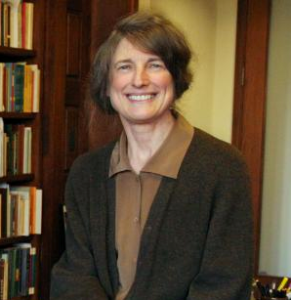Adail Sobral, Bakhtiniana’s Editorial board member, Catholic University of Pelotas (UCPEL), Pelotas, RS, Brazil
Caryl Emerson teaches Slavic Languages and Literatures; and Comparative Literature in the Department of Slavic Languages and Literatures at the University of Princeton. Her most recent publications include: The Cambridge Introduction to Russian Literature; The Life of Musorgsky; and The First Hundred Years of Mikhail Bakhtin (Os cem primeiros anos de Mikhail Bakhtin, translated in Portuguese by Pedro Jorgensen Jr., Rio de Janeiro: DIFEL, 2003).
In the paper Creative Ways of Not Liking Bakhtin: Lydia Ginzburg and Mikhail Gasparov / Maneiras criativas de não gostar de Bakhtin: Lydia Ginzburg e Mikhail Gasparov (Bakhtiniana, Vol. 11/1), she discusses ideas from two authors who do not like Bakhtin, showing that in some ways they are not so opposed as they think they are, and, more than this, that their being against an author the reader may like may be an excellent challenge for a reader who is one of those “who understand”, and are thus creative, as Bakhtin says in “From Notes Made in 1970-71,” Speech Genres and Other Late Essays. Translated by Vern W. McGee, Edited by Caryl Emerson and Michael Holquist (Austin: University of Texas Press, 1981), 142.
In this interview, Caryl Emerson talks about the paper and its proposals; about the so-called idealistic side of Bakhtin’s thoughts; the most important contribution of his as regards language; and also about how to be disciplined in using Bakhtin’s concepts and explore “one-sidedness” at the same time.
1. What is in your opinion the most important contribution given by Bakhtin for understanding language?
His most important contribution has two parts: first, that the speaker does not own his or her own words, but “rents” them in the interests of communication—and thus every utterance must have an addressee, whether concrete or virtual. No single unit of language signifies “by itself.” And second, although Bakhtin fully endorsed the 20th-century’s “linguistic turn” (and thus could be indifferent to the organizing power of such realities as embodied scenes, music, body movement, wordless silences), he was against any isolation and enclosure in a text, any “work-centered poetics.” Against the Formalists at one extreme, Bakhtin argued that all verbal meaning was contextual, historical, and constantly mutating. Against crude sociologists at the other extreme, he argued that each individual internalizes the words of the outside world and “pluralizes” herself differently. Bakhtin is a socially-inflected personalist.
2. Do you agree that Bakhtin’s insistence on dialogue as the human condition is idealistic or do you recognize also the presence of something almost tragic in his idea of our being condemned to dialogue?
This is a complex question. It is true that Bakhtin tends to celebrate dialogue’s mutually enriching and benevolent sides. In his view, novelistic polyphony is always harmonious; differences increase our options and thus increase our freedom, they do not lead to hopeless cacophony or violence. It is indeed idealistic to claim, as he did late in life, that although we need boundaries and demarcations we should always do without a border police. And even if thoroughgoing dialogue did succeed in defining every particle of our being, this scenario would deprive us of privacy, a stable core, self-definition, and perhaps even of personal responsibility. Dialogism is not large enough to encompass a sense of the irreversibly tragic. Because Bakhtin insists on an optimistic and open dialogic model of the universe, his close readings of such literary masters as Rabelais and Dostoevsky can quickly turn satire into comedy, desperation into hope, chaos into existential freedom, demonic laughter into carnival ambivalence, and bad infinity into infinite open dialogue. In 1929, it was not only Marxist party-line critics, many of whom routinely accused Bakhtin of “idealism,” who noticed that crucial aspects of Dostoevsky had disappeared.
Bakhtin did have a tragic vision, however, which broke through briefly during the darkest years of the Second World War: his writing on Shakespearean tragedy, his essay “Rhetoric, to the extent that it lies,” and his meditations on “self-cognition and self-evaluation” [samopoznanie i samotsenki]. The pessimism in these notes is not, strictly speaking, due to a sense of being “condemned to dialogue,” but rather of being condemned to brute matter, the brute image and reified word, what he called “thing-cognition” rather than “personality-cognition.” The only way out of reification is radical love. These wartime texts, just now being translated into English, are not a well-known part of Bakhtin’s legacy, and they provide a bridge to Bakhtin’s peculiar Christianity.
3. How do you think we may cultivate discipline in using Bakhtin’s concepts and at the same time explore “one-sidedness” such as proposed by him?
Fortunately, in the past fifteen years (after the Bakhtin Boom receded and scholarship became more serious on about his sources and intellectual antecedents), a new and welcome sobriety has begun to characterize our subject. The “one-sidedness” of Bakhtin’s thought, however, remains: its preference for benign open-endedness, unfinalizability, uninterrupted horizontal exchange, porous heterogeneous wholes, and its bottomless faith in the restorative potency of the word. The “dark Bakhtin” noted above will adjust this picture somewhat. In the mid-1940s, Bakhtin appeared to lose faith in the word, the image, the mission of the writer, and even the very possibility of representation, all of which, he noted, had succumbed to violence and the lie. Amid these ruins of culture, Bakhtin recommends that we fall silent and exercise a discerning, although non-condemning, sacrificial love. Bakhtin on Shakespeare is not our familiar, rosy, hopeful Bakhtin. The pessimism of these notes is startling. There are no open-ended dialogues, no words-with-a-loophole, no trace of that generous default position that Bakhtin called “Great Time,” no unfinalizability or rejuvenating grotesque, no bonds of family love. Children thirst to kill their parents; parents are suspicious of their offspring. In Shakespearean tragedy Bakhtin sees only power, brutal instinct, fear of extinction, and the desire of rulers to hang on, no matter what. This Bakhtin calls destructive self-affirmation. When measured against the collective life cycles of folklore and carnival, an individual life—in fact, individuation as such—can only be tragic. This is a painful position for a personalist to adopt. While addressing Shakespearean tragedy, Bakhtin performs another service. He counsels us on some proper, and even profound, ways to be serious. Here Bakhtin has in mind unofficial forms of seriousness (that is, non-exploitative forms): weakness, sadness, suffering, timidity, “the seriousness of the slave and the seriousness of the victim.” Two dozen pages are all we have of his unrealized project on “seriousness”—or, as he referred to it, the “seriousification of the world” [oser’eznenie mira].
4. What is your creative way of (un)liking Bakhtin?
My reservations about Bakhtin, which are inseparable from any serious love relation with another personality, largely parallel the “unliking” of Bakhtin’s theories by his most principled opponent in Soviet and then post-communist Russia: the verse scholar, classicist and philologist Mikhail Gasparov (1935-2005). Gasparov distrusted Bakhtin’s too-intuitive research methods, his willingness to work with literary traditions (like Menippean satire) that existed only in tiny fragments, his indifference to artistic wholes. But mostly Gasparov did not endorse the mysterious, and to him mystifying, powers of eternal rejuvenation that Bakhtin invested in the uttered word. It is more respectful toward a cultural trace of the past to treat it as a precious but sealed-up thing, he argued; we cannot and should not pretend to “talk” with it. That is merely to talk with ourselves, to look in the mirror, answering questions that we ourselves have asked. Past texts were not written for us or with us in mind. Everywhere in scholarship Gasparov took a stand for epistemological modesty. Communication between people and texts is far more difficult than we would like to believe. Bakhtin makes it appear easy and pleasant, within anyone’s grasp. And although Bakhtin had huge gifts, as a pedagogical method for training young scholars in the discipline, dialogism could only be disastrous. The Bakhtin-Gasparov debates are a fascinating watershed in academic discourse, worthy of wide distribution, for each side has its rigorous logic and spiritual substance.
To read this article, access
EMERSON, C. Creative Ways of Not Liking Bakhtin: Lydia Ginzburg and Mikhail Gasparov. Bakhtiniana, Rev. Estud. Discurso [online]. 2016, vol.11, n.1, pp.42-76. [viewed 31th March 2016]. ISSN 2176-4573. DOI: 10.1590/2176-457324391. Available from: http://ref.scielo.org/w5vmj4
External link
Bakhtiniana – BAK: www.scielo.br/bak
About Adail Sobral
Adail Sobral, PhD, Applied Linguistics and Language Studies Pontifical Catholic University of Sao Paulo (2006). Assistant Professor IV. Applied Linguistics Program, Catholic University of Pelotas, Pelotas, RS – Brazil. MA, Letters — University of Sao Paulo (1999). Specialized in Linguistics —UNICAMP (1985). BA in English at Universidade Federal da Bahia (1977). He is an author of books, papers and book chapters about Bakhtin and his Circle, semiotics, translation, education, and language in general.
Como citar este post [ISO 690/2010]:














Últimos comentários